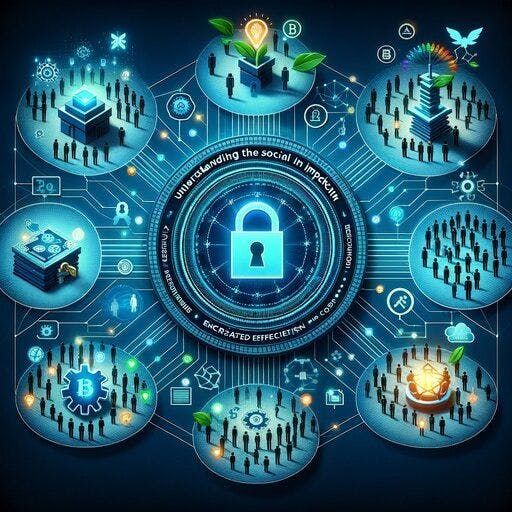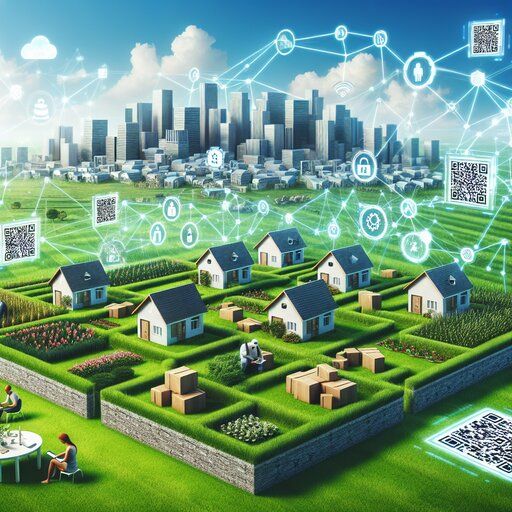
Understanding the social impact of blockchain
19 Jan 2024

19 Jan 2024
In this post, we delve into the transformative influence of blockchain on social fabric and governance: a technology forging new paths for collective responsibility and equity. Blockchain's applications are far-reaching, but its most profound effects may reshape societal norms and institutions.
Beyond its function as an immutable and transparent digital ledger, blockchain stands as an architectural change agent for trust in societal systems. It presents opportunities to redefine transparency, redistribute power, and secure the sanctity of information exchange—from property rights and fair trade verification to securing democratic voting processes and ensuring creators are fairly compensated.
With an in-depth examination of blockchain's societal impact, you'll grasp not only the intricacies of the technology but also its potential to create more inclusive, decentralized, and equitable social structures. Come along as we explore how blockchain is poised to redefine our collective future, one block at a time.
Blockchain's history is intertwined with the advent of Bitcoin in 2008, conceived by the pseudonymous Satoshi Nakamoto as a peer-to-peer digital currency operating independently of central banks. The underlying blockchain technology secured Bitcoin's transactions, ensuring trust in a system where no single entity had control.
Innovators pondered its broader applications because blockchain's value far exceeded cryptocurrency. Beyond securing digital currency, blockchain offered to revolutionize data management with its immutable and transparent ledger, decentralize authority across numerous nodes, and introduce smart contracts that execute based on code, thereby dismantling intermediary reliance.
This innovation underlies a critical transformation of vested systems, positioning blockchain as a tool to democratize access, fortify data integrity, and herald a new social and economic interaction era. The implications for industries are staggering, spanning secured property ownership to transparent supply chains—a promise of profound social impact that continues unfolding.
As we look closer into blockchain's role in today's digital environment, it becomes clear that its effects can broadly be categorized into three key areas.
Digging into the first area, Enhanced Security and Trust, we'll illustrate how blockchain's architecture significantly improves the protection of data and bolsters transaction trust. This part of our discussion will highlight real-world scenarios where the steadfast nature of blockchain technology plays a vital role in securing information and building credible digital relationships.
Next, we'll turn our attention to Increased Efficiency and Cost Reduction. Here, we'll examine how blockchain is defensively strong and a force for streamlining business processes. By revisiting various industry cases, we'll see firsthand how blockchain can eliminate waste, simplify complex systems, and lower business costs.
Lastly, we'll delve into Empowerment through Decentralization, analyzing how blockchain gives more control back to individuals and communities. This section will cover how the spread of authority inherent in blockchain can level out power dynamics and grant people more say and stake in their economic and social interactions.
These three primary themes will shape our exploration into blockchain's transformative effects. Each theme forms a critical part of blockchain's overall promise and will act as a roadmap for understanding this technology's broad and compelling applications.

Blockchain's design is genius for boosting security and trust in digital transactions. At its heart, it creates an unalterable record of transactions that is nearly immune to fraud. This record is critical in a world where digital information can be easily manipulated. Every block on the chain carries a unique fingerprint called a hash, plus the hash of the block before it. Changing any piece of information would alter the block's hash, making it instantly clear that tampering has occurred.
One of the most notable use cases for this enhanced security and trust is in financial transactions. Banks and financial institutions are exploring blockchain to prevent fraud, reduce errors, and create unchangeable audit trails. It's like having an incorruptible digital ledger for everything from daily transactions to complex international money transfers.
Another important application is in supply chain management. Companies can track the journey of a product from the manufacturer to the store shelf, with every step verified and recorded on a blockchain. This means you can trust that your coffee is fair trade or your sneakers weren't made in a sweatshop.
Then there's voting systems. Implementing blockchain can make the process immune to the rigging and errors that plague traditional voting. Every vote would be a block, making the final tally faster and publicly verifiable without revealing individual voter identity.
In identity verification, blockchain can provide a secure way to manage our digital identities. Your info could be stored on a blockchain, giving you control over who sees it and what they see, nearly eliminating identity theft.
Lastly, smart contracts are reshaping how we engage in legal agreements. These self-executing contracts with the terms written into code are stored and replicated on the blockchain, making them nearly impossible to tamper with. This breeds a new level of confidence in digital agreements.
These use cases are just the tip of the iceberg. As blockchain technology matures, it's expected to spawn a wave of new applications that further enhance the security and trust of our digital world.
What's next?
The landscape of enhanced security and trust through blockchain could radically transform in the next two decades. Financial systems might evolve to become marvels of transparency and efficiency, with blockchain's immutable ledgers significantly trimming the rates of fraud and embezzlement. Supply chains could take on new levels of integrity, allowing consumers to trace a product's journey from its origin to their hands with a few clicks, thereby ensuring authenticity and ethical production methods. Similarly, voting systems could leverage blockchain to uphold the sanctity of democracy, enabling tamper-proof elections and fostering greater civic engagement due to renewed voter confidence. In terms of personal identity, blockchain might become the gold standard for managing digital identities, making identity theft an archaic concern. This era of fortified digital trust could usher in a shift in how agreements are addressed, with smart contracts automating and securing transactions from real estate to intellectual property rights, potentially dissolving barriers to entry and making legal and contractual processes more inclusive and equitable. The ripple effects of such profound enhancements in security and trust will likely be far-reaching, as trust is a fundamental currency in this increasingly interconnected digital age.

Blockchain technology is tailor-made for making operations more efficient and cutting costs. By removing the need for middlemen or intermediaries in transactions, processes that once took days can now happen in minutes. Efficiency gains are coupled with cost reduction by streamlining administrative and operational processes that traditionally require heavy manual effort and extensive auditing.
One of the most clear-cut examples is in cross-border payments. Traditionally, sending money abroad has been a slow and expensive affair due to the involvement of multiple banks and financial services. With blockchain, these transactions can occur directly and securely between parties, significantly reducing the time and fees associated with multiple transfer points.
In the world of document verification, blockchain can dramatically reduce the time spent verifying the authenticity of documents like educational degrees, property titles, and legal papers. The permanence and transparency of blockchain records mean that once a document's details are entered, they can be trusted indefinitely, eliminating repetitive verification.
Blockchain also has promising implications for healthcare, where it could streamline patient record management by unifying fragmented data systems within and across medical facilities. This would improve care coordination and reduce administrative costs and the risks of clerical errors.
Supply chain efficiencies are another prime area of change. Blockchain could significantly reduce inventory mismanagement, fraud, and errors by allowing all parties to access a shared, unchangeable ledger. This commonality enables all parties to react swiftly to supply and demand changes and can cut the costs of moving goods and tracking their progress from factories to consumers.
For intellectual property and royalties, blockchain simplifies and makes the distribution of payments more transparent. Artists, writers, and creators can use blockchain to automatically receive compensation as their work is purchased or used, ensuring fair and consistent royalty distribution.
Looking into the future, as blockchain becomes more integrated across industries, the expectation is for a broad-scale recalibration of operational costs. Reduced bureaucracy, leaner processes, and refined trust mechanisms herald a promising shift towards an economy where the reduced overheads and heightened efficiencies are not just a boon but a standard expectation.
What's next?
In the coming 10 to 20 years, the potential for "Increased Efficiency and Cost Reduction" through blockchain could manifest in some transformative ways. We might anticipate international financial transactions becoming nearly instantaneous and significantly cheaper, disrupting the traditional banking sector and offering more equitable access to global markets. In sectors like healthcare, blockchain could unify patient records, dramatically improving medical outcomes and reducing operational costs, potentially saving billions in administrative overhead. Supply chains may become so efficient and transparent that consumers could have real-time data on product origins and shipping, while businesses could nearly eliminate counterfeiting and drastically reduce waste. As for creative industries, blockchain could ensure that artists receive their due without delays or disputes, fostering a fairer and more sustainable ecosystem for content creation. The cumulative effect of these efficiencies could be a world where the savings of time and costs are redirected towards innovation and growth, sparking a new era of economic development that's more inclusive and far-reaching.

At the core of blockchain's promise is the concept of decentralization, which shifts control away from central authorities and distributes it across a network. This model empowers individuals by giving them more control over their data, transactions, and interactions. By design, this minimizes the influence of any single entity, leading to systems that are more resilient, transparent, and democratic.
One pivotal area where decentralization is making waves is in financial services. Blockchain enables the creation of decentralized finance, or DeFi, platforms that operate without traditional banks or financial intermediaries. Users can borrow, lend, and invest through peer-to-peer networks with more autonomy, often enjoying better rates and more inclusive access to financial products.
In content distribution, blockchain proposes a new way for creators to connect with their audiences. Platforms could run decentralized, allowing artists to distribute their content directly to the consumer, stripping away the need for publishers or record labels and ensuring creators get a fairer share of the profits.
The gig economy stands to be revamped through blockchain as well. Decentralized platforms could enable individuals to offer their services directly to others, bypassing companies that typically serve as expensive intermediaries. This can help freelancers retain more of their earnings and have more control over their work engagements.
When it comes to data ownership, blockchain technology empowers individuals to take ownership of their data. Big companies have control over user data, but with blockchain, users could manage who has access to their information and under what conditions, potentially transforming privacy and data security.
Moreover, the impact on voting systems can be vast. Blockchain can decentralize the voting process, making it more accessible and secure. Such a system would reduce the risk of fraud and manipulation while ensuring the integrity of electoral processes, thereby strengthening democratic participation.
As blockchain technologies mature over the next few decades, we can expect these use cases to expand and evolve. Empowerment through decentralization could herald a shift towards more user-centric systems across industries, reshaping the landscape to prioritize individual agency and equity. This development might stimulate a wave of innovation as people harness the freedom to collaborate, transact, and govern in previously unattainable ways.
What's next?
In the "Empowerment through Decentralization" sphere, the coming 10 to 20 years could see profound shifts that put individuals firmly in control of their financial destiny, creative output, and personal data. The expansion of DeFi platforms could fundamentally alter our relationship with money, where decentralized banks, powered by blockchain, make financial inclusion a global reality and dramatically lower the barrier to banking services. In the creative industries, we could witness a new renaissance where artists harness direct-to-consumer distribution, squeezing out gatekeepers and fostering a direct, unfiltered connection with their audiences, shaking the foundations of how media is produced and consumed. With data sovereignty becoming a cornerstone of digital citizenship, personal data could be treated as private property, paving the way for a privacy-centric internet experience. Even democratic processes might be reinvented, as decentralized voting platforms ensure every vote is verifiable and secure, potentially increasing participation and trust in electoral systems worldwide. The empowerment gained through such decentralization could see a rise in local and global governance models and economic systems that are more equitable, participatory, and resilient against centralized power and control, heralding a new chapter in the democratization of society.

Background: Georgia was among the first to implement blockchain technology in public services. They aimed to increase security in their land registry system, a critical area where trust is paramount. By digitizing land titles using a blockchain platform, the Georgian National Agency of Public Registry wanted to reduce fraud and enhance the transparency of real estate transactions.
Lesson Learned: The initiative demonstrated that blockchain could provide a secure and transparent framework for legal documentation and property transactions. The country successfully showed the potential of blockchain to replace traditional, paper-based systems, thus reducing the avenues for corruption and enhancing the ease of doing business.
Illustration of Blog's Point: This case study encapsulates the theme of enhanced security and trust offered by blockchain. Real estate transactions become more trustworthy when underpinned by blockchain's immutable and transparent nature, proving the technology's value in critical legal structures.
Background: To combat the issue of counterfeit drugs and improve supply chain transparency, IBM and Walmart collaborated on a pilot project to leverage blockchain. By tracking drug shipments on a blockchain ledger, the project aimed to ensure each stakeholder in the supply chain could see the history and status of the product journey.
Lesson Learned: The joint venture demonstrated how blockchain could enhance supply chain efficiency and significantly reduce associated costs, particularly verification and tracking. This case highlighted blockchain's capacity to streamline operations and drastically improve the integrity and trustworthiness of entire supply systems.
Illustration of Blog's Point: The IBM and Walmart collaboration firmly showcases blockchain's role in increasing efficiency and reducing costs within supply chains. This real-world application vividly illustrates the efficiencies and cost savings that blockchain can deliver.
Background: The DAO was an ambitious project to create a new form of organizational governance. By codifying rules and decision-making processes into smart contracts on the Ethereum blockchain, The DAO sought to eliminate the need for traditional corporate structures, offering a form of venture capital fund managed by its stakeholders.
Lesson Learned: Despite its ultimate downfall due to a security flaw, The DAO taught valuable lessons about decentralized systems' potential and current limitations. It highlighted the technological and social challenges of shifting power dynamics from centralized authorities to a distributed network of participants.
Illustration of Blog's Point: The DAO clearly demonstrates the empowerment that can be achieved through decentralization. The case study embodies a real-world experiment of giving end-users and stakeholders decision-making authority. It underscores the more significant trend of moving toward more inclusive and democratic forms of governance made possible by blockchain.
We're at the dawn of a remarkable transformation era, where blockchain technology is already making significant strides. The progress is palpable and exciting, from increasing the trustworthiness of property transactions to bringing new clarity to supply chains. Early ventures into blockchain, like The DAO, provide insightful case studies into both the strengths and challenges of decentralized systems. These are more than just tales; they are the forerunners of extensive changes we expect in governance and other societal areas.
Blockchain's influence goes beyond technological advancements; it's actively reshaping our social and economic frameworks, promising greater control and empowerment for individuals and communities. This technology is breaking down barriers and opening up new avenues for innovation in various sectors. If you're wondering whether it's too late to join this revolution, rest assured it's an ongoing journey with vast exploration opportunities. Now is an ideal time to get involved, as the foundations we lay today will spearhead the groundbreaking developments of the future.
As we continue this journey, blockchain's potential to transform every aspect of our lives is only starting to unfold. Its growing presence and influence encourage us to consider its role in revolutionizing various sectors.
In this landscape, Gridlock's role is to refine the crypto wallet experience, focusing on security, user-friendliness, and straightforwardness. We are dedicated to delivering dependable, easy-to-use solutions that resonate with the broader potential of blockchain to influence social and economic systems, mindful of our place in this ongoing evolution.
If you enjoyed this summary, read more about the social impact of blockchain here.
- - -
Written by Mason Winsed

Mason Winsed simplifies blockchain for the people. With a comp-sci background and a passion for crypto safety, he's your go-to for straight-forward crypto wisdom. In his off time, he's coding or gaming. Join Mason for a no-nonsense crypto talk.